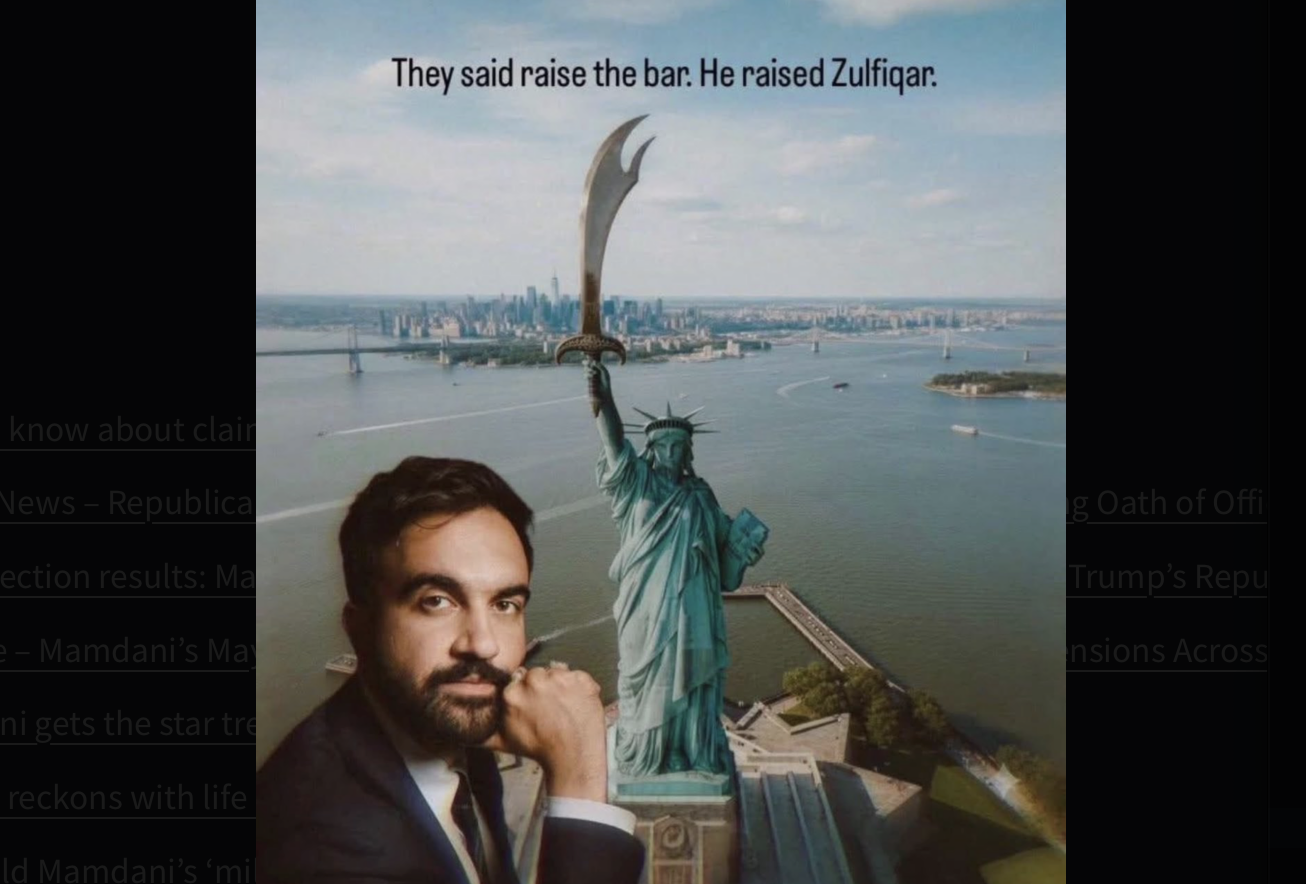Zohran Mamdani’s Mayoral Reign Begins Amid Fake ISIS Endorsement, GOP Attacks, and Clash with President Trump
Source: Telegram
Executive Summary
New York City’s newly elected mayor, Zohran Mamdani, began his term in a storm of controversy following a falsified ISIS “endorsement” that spread online, a coordinated Republican effort to bar him from office under the 14th Amendment, and escalating verbal clashes with President Trump. Despite the disinformation campaign and partisan backlash, Mamdani’s historic victory marks a political realignment in America’s largest city—one defined by generational change, progressive policies, and intensifying national polarization.
Key Judgments
Key Judgment 1
The fake ISIS “endorsement” of Mamdani was a deliberate disinformation operation aimed at delegitimizing his victory and amplifying Islamophobic narratives.
Evidence: Snopes confirmed that the supposed endorsement never appeared on official ISIS channels and was inconsistent with the group’s style or ideology. Expert Laurence Bindner noted it was “inconceivable” that ISIS, which views Shia Muslims as apostates, would support Mamdani, a Shia democratic socialist. The release, circulated across X and Facebook, mirrored prior smear campaigns targeting Muslim politicians.
Key Judgment 2
House Republicans are using the fake endorsement and Mamdani’s leftist platform to test new constitutional challenges under the 14th Amendment’s “insurrection clause.”
Evidence: Jewish Breaking News reported that Reps. Claudia Tenney and Marlin Stutzman are drafting legislation to bar Mamdani from office, citing his opposition to ICE enforcement and alleged ties to “anti-American causes.” Similar measures against Donald Trump failed in 2024, but the move reflects a broader Republican strategy to criminalize ideological dissent.
Key Judgment 3
Mamdani’s landslide election represents both a generational and ideological shift in urban politics, signaling a broader national backlash to Trump-era populism.
Evidence: SBS News and AP reported that Democrats swept key races nationwide, with Mamdani securing over one million votes—the highest since 1969—and directly confronting Trump in his victory speech. Polls showed Trump’s approval dropping below 40%, and his threats to “take over” New York backfired, galvanizing urban voters.
Key Judgment 4
The economic elite are recalibrating after Mamdani’s win, balancing resistance to his redistributive agenda with pragmatic engagement.
Evidence: NPR and USA Today documented Wall Street’s mixed reactions—ranging from fears of a millionaire exodus over Mamdani’s proposed 2% tax on incomes over $1 million to cautious optimism from business leaders like Kathryn Wylde. Empirical studies cited by USA Today found “no significant tax-motivated migration,” suggesting the threat of capital flight may be overstated.
Key Judgment 5
Mamdani’s feud with Trump is emerging as a defining axis of U.S. political theater, with implications for federal funding, immigration policy, and urban governance.
Evidence: The Associated Press reported Trump threatened to defund or “take over” New York if Mamdani won. In response, Mamdani declared, “To get to any of us, you will have to get through all of us,” framing his administration as a bulwark against authoritarianism. Trump’s Truth Social post—“…AND SO IT BEGINS!”—signaled ongoing confrontation.
Analysis
Zohran Mamdani’s ascent to the mayoralty of New York City encapsulates the evolving tension between progressive urban governance and the populist nationalism of Trump’s second presidency. His victory—secured amid threats, smears, and disinformation—demonstrates both the resilience of democratic participation and the vulnerability of public discourse to manipulation.
The fake ISIS endorsement was emblematic of modern influence operations: visually credible, ideologically absurd, but politically effective in sowing distrust. By associating Mamdani with terrorism, the campaign sought to weaponize post-9/11 fears and preexisting Islamophobia. Experts from JOS Project and MEMRI highlighted that the forgery contradicted ISIS’s theological framework and communication patterns, suggesting the operation was domestic or politically motivated rather than extremist in origin.
Republican lawmakers’ subsequent invocation of the 14th Amendment underscores a growing willingness to use constitutional mechanisms as political tools. Unlike the Trump-related “insurrection clause” cases, which focused on overt acts, the Mamdani challenge hinges on perceived ideological disloyalty—an alarming precedent for political pluralism. Such rhetoric risks further eroding democratic norms by framing dissent as rebellion.
Economically, Mamdani’s proposed millionaire tax and rent freeze pose significant challenges to the city’s fiscal landscape. Yet early reactions from the financial sector show pragmatism rather than panic. While some executives warn of flight, the historical evidence suggests high earners rarely relocate over moderate tax changes. The deeper question for corporate stakeholders is not whether they can afford Mamdani’s New York, but whether they can adapt to a city increasingly defined by redistributive governance and populist accountability.
The personal dynamic between Mamdani and Trump is shaping into a symbolic national duel. Trump’s threats to defund the city and deploy federal enforcement reflect his ongoing pattern of targeting opposition-led jurisdictions. Mamdani’s rhetoric—positioning New York as “the city that gave rise to Trump, and the city that will defeat him”—mirrors the former president’s populist style while inverting its ideological substance. This confrontation will likely dominate national headlines, framing the 2026 midterms as a referendum on both leadership styles.
At the same time, Mamdani’s early appearances at the Somos conference in Puerto Rico suggest he is actively consolidating power within the Democratic establishment he once opposed. His outreach to Governor Hochul and Attorney General Letitia James indicates an effort to bridge ideological divides without abandoning his reformist platform. This balancing act—between movement politics and pragmatic governance—will define his early administration.
Strategically, Mamdani’s victory highlights a shifting U.S. political environment where urban centers are consolidating progressive power while federal institutions tilt conservative. For intelligence and security professionals, the incident underscores the growing nexus between disinformation, identity politics, and domestic stability. As foreign and domestic actors exploit digital platforms to shape perception, the Mamdani-ISIS hoax serves as a case study in how false narratives can influence real-world governance and public trust.


